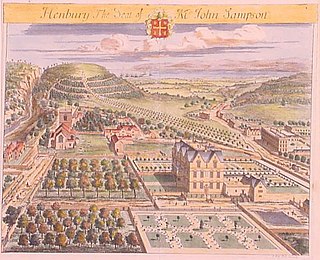
Robert Montagu, 3rd Duke of Manchester was a British politician who sat in the House of Commons from 1734 until 1739 when he succeeded to the peerage as Duke of Manchester.

Francis William Drake was an officer of the Royal Navy. He served during the War of the Austrian Succession, the Seven Years' War and the American War of Independence, rising to the rank of vice-admiral of the red.

John Morton was an English lawyer and Tory politician who sat in the House of Commons between 1747 to 1780.
Sir Robert Lawley, 5th Baronet was an English landowner and politician who sat in the House of Commons from 1780 to 1793.

Sir Charles Frederick KB FRS was a British politician who sat in the House of Commons from 1741 to 1784.

James Brudenell, 5th Earl of Cardigan, styled The Honourable James Brudenell until 1780 and known as The Lord Brudenell between 1780 and 1790, was a British courtier and politician who sat in the House of Commons from 1754 to 1780 when he was raised to the peerage as Baron Brudenell.

Sir Thomas Clavering, 7th Baronet was a British landowner and Member of Parliament.

James Buller of Morval in Cornwall and of Downes and King's Nympton in Devon, was a Member of Parliament for East Looe in Cornwall (1741-7) and for the County of Cornwall (1748-1765). He was ancestor of the Viscounts Dilhorne and the Barons Churston and built the Palladian mansion Kings Nympton Park in Devon.

Abel Smith of Wilford House in the parish of Wilford, near Nottingham, England, was one of the leading bankers of his time and served thrice as a Member of Parliament.

Sir Samuel Fludyer, 1st Baronet, of Lee Place in Kent, was an English merchant and banker who served as a Member of Parliament and Lord Mayor of London.

Sir John Wrottesley, 8th Baronet, of Wrottesley Hall in Staffordshire, was a British army officer and politician who was a Member of the British House of Commons from 1768 to 1787.
Sir John Barrington, 9th Baronet was a British politician who sat in the House of Commons from 1780 to 1796.

Sir William Meredith, 3rd Baronet, was a British landowner who sat in the House of Commons from 1754 to 1780. A Rockingham Whig, he served as a Lord of the Admiralty from 1765 to 1766.
Lieutenant-General George Boscawen was a British Army officer and politician, the fourth son of Hugh Boscawen, 1st Viscount Falmouth.
Captain John Robert Jenkinson was a British Army officer, courtier and Member of Parliament.

Booth Grey was an English politician who served in the House of Commons from 1768 to 1784.
Sir George Robinson 5th Baronet (1730–1815), was a British landowner and politician who sat in the House of Commons from 1774 to 1780.
Charles Herbert (1743–1816) was a Royal Navy officer and British politician who sat in the House of Commons as Member of Parliament for Wilton from 1775 to 1780, then 1807 to 1816.

Sir Patrick Blake, 1st Baronet was a British politician who sat in the House of Commons between 1768 and 1784
Lord Lonsdale's ninepins, Sir James's ninepins, or Lowther's ninepins, was a derogatory label applied to certain Members of Parliament during the Georgian era who owed their Parliamentary seats to the patronage of James Lowther, 1st Earl of Lonsdale (1736–1802).













